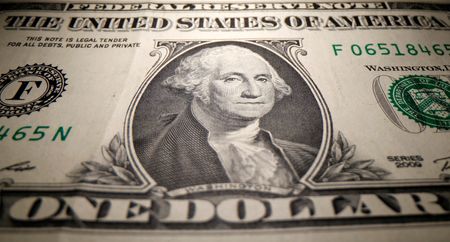By Stephen Culp
NEW YORK (Reuters) -Wall Street reversed early gains on Thursday as a mixed employment report diminished hopes for further easing by the Federal Reserve this year and as worries resurfaced over inflated tech valuations, unassuaged by Nvidia’s better-than-expected earnings report.
All three major U.S. stock indexes closed sharply lower, with weakness in artificial intelligence-related momentum stocks dragging the tech-heavy Nasdaq down the most. Benchmark Treasury yields dipped and bitcoin tumbled, offering further signs of market participants’ souring risk appetite.
Chipmaker and AI darling Nvidia posted its hotly anticipated results after Wednesday’s closing bell, delivering consensus-beating earnings and stronger-than-expected forward guidance, which initially soothed fears over inflated valuations in the sector.
But jitters over inflated tech stock prices returned as the session progressed, resulting in the Nasdaq’s widest one-day swing since April 9, a difference of 4.9 percentage points.
“There was a lot of anticipation about Nvidia and it was a good report,” said Thomas Martin, senior portfolio manager at GLOBALT in Atlanta. “But the other questions are still there: What is happening with inflation? Employment? What is the Fed going to do? There’s still confusion about tariffs.”
“People just aren’t done selling yet,” Martin added. “The market is adjusting, this is what an adjustment process looks like.”
U.S. employment data, unavailable throughout the six-week federal government shutdown, reported more jobs than expected, but a surprising uptick in the unemployment rate suggested a softening in labor market conditions.
A separate report showed ongoing jobless claims hitting their highest level in nearly four years.
But the September jobs report is stale, and because of the decision to combine the October and November reports, the U.S. Federal Reserve will have just one month of dated employment numbers to inform its rate decision at next month’s policy meeting.
Financial markets are pricing in a 39.8% likelihood that the central bank will implement its third interest rate cut of the year at the meeting, down from about 50% at the same time last week and a near certainty a month ago, according to CME’s FedWatch tool.
But not everyone agrees.
“The Fed is going to have to go on its own guts, and from a contrarian viewpoint, I believe that they will cut by 25 basis points,” said Peter Cardillo, chief market economist at Spartan Capital Securities in New York.
“The rhetoric that we’re hearing from a lot of Fed members is just playing it safe,” Cardillo added. “But I think the dovish members are probably going to win, and they are going to be right.”
FROM RALLY TO SELLOFF
The CBOE Market Volatility index, considered a barometer of investor anxiety, closed at its highest level since late April.
The Dow Jones Industrial Average fell 386.51 points, or 0.84%, to 45,752.26, the S&P 500 fell 103.40 points, or 1.56%, to 6,538.76 and the Nasdaq Composite fell 486.18 points, or 2.15%, to 22,078.05.
European shares gained following Nvidia’s earnings beat but pared their advance amid renewed uncertainty regarding the Fed’s monetary policy path.
MSCI’s gauge of stocks across the globe fell 9.01 points, or 0.92%, to 968.20.
The pan-European STOXX 600 index rose 0.4%, while Europe’s broad FTSEurofirst 300 index rose 8.72 points, or 0.39%.
Emerging market stocks rose 9.58 points, or 0.70%, to 1,369.89. MSCI’s broadest index of Asia-Pacific shares outside Japan closed higher by 0.8%, at 703.56, while Japan’s Nikkei rose 1,286.24 points, or 2.65%, to 49,823.94.
U.S. Treasury yields dropped in the wake of the mixed employment data as investors assessed the probability of further easing from the Fed before the year end.
The yield on benchmark U.S. 10-year notes fell 3.1 basis points to 4.1%, from 4.131% late on Wednesday.
The 30-year bond yield fell 1.9 basis points to 4.7328% from 4.752% late on Wednesday.
The 2-year note yield, which typically moves in step with interest rate expectations for the Federal Reserve, fell 4.4 basis points to 3.554%, from 3.598% late on Wednesday.
The dollar firmed as the jobs data tempered monetary policy expectations.
The dollar index, which measures the greenback against a basket of currencies including the yen and the euro, rose 0.16% to 100.25, with the euro down 0.1% at $1.1525.
Against the Japanese yen, the dollar strengthened 0.22% to 157.49.
In cryptocurrencies, bitcoin fell 4.44% to $86,514.72. Ethereum declined 4.85% to $2,843.98.
Oil prices initially got a boost from a bigger-than-expected draw on U.S. crude stockpiles, but reversed those gains amid the push for a U.S.-brokered end to Russia’s war on Ukraine.
U.S. crude dipped 0.55% to settle at $59.14 per barrel, while Brent settled at $63.38 per barrel, down 0.2% on the day.
Gold prices inched lower as investors assessed the delayed jobs report. Spot gold fell 0.06% to $4,078.15 an ounce. U.S. gold futures fell 0.18% to $4,070.50 an ounce.
(Reporting by Stephen Culp; Additional reporting by Caroline Valetkevitch in New York and Marc Jones in London; Editing by Rod Nickel, Deepa Babington and Edmund Klamann)











